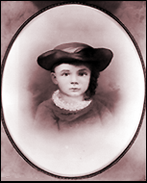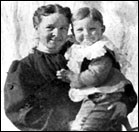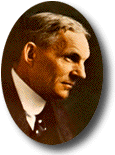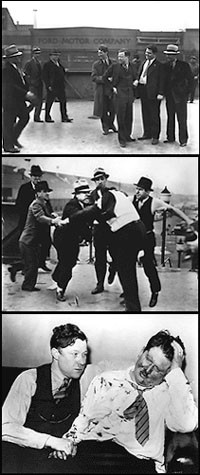Born on July 30th, 1863, in Greenfield Township, Michigan, Henry Ford was the son of William Ford, an Irishman, and Mary Litigot, of Dutch descent. Early on, he showed a precocious aptitude for all things mechanical. He attended school until the age of 15, and at 16, was apprenticed in The Michigan Car Company Store.

At age 17, he began working for the Michigan Car Works for $1.10 an hour. While working there, he realized his interest in engines. Two years later, he mastered the trade of engines. In 1884, he attended a three-month business class.
In 1888, he married Clara Bryant. It was in the home he built for her that his first gasoline engine diagram was drawn. In 1891, the couple moved to Detroit, so that Ford could work on building the engine. As a machinist, he made $45 a week, and worked 12-hour days. In his spare time, he worked on his engine.

When his first engine was complete, he tested it in his kitchen. A success. Then, in 1893, his only son, Edsel Ford, was born. Edsel was three years old when he rode with his parents to his grandfather�s farm in Ford�s first car.
Years later, he opened his first car company, the Detroit Edison company. He soon abandoned that company, and started another, the Henry Ford Company. In 1902, he left the company. It later became the Cadillac Motor Car Co.

He soon formed the Ford Motor Co. Until the famous Model T, he didn�t hit the mother lode. The "Tin Lizzie" was a big success. Within the span of five years, there were upwards of 500,000 Tin Lizzies on the road.
It was after this great success that he did the unthinkable. He increased his wages to $5 an hour. His wages were to be controversial for a long time. He also eventually shaved an hour off the standard workday, trimming it down to 8 hours.
In 1918, he had an unsuccessful bid for the Senate. In 1919, he turned the company over to his son, Edsel. He continued to design cars and the Model A came out.
When the Great Depression hit, Ford Motor Co. felt the pinch. Ford resented America�s involvement in World War II, but during the war, his plants turned out 86,865 complete aircraft, 57,851 airplane engines, 4,921 military gliders, and thousands of engine superchargers. It was during the war that Edsel Ford died.
The cause of death was cancer and undulant fever. Henry Ford again took over the company. He controlled it until 1945, when his grandson, Henry Ford II, eldest son of Edsel Ford, took over. Henry Ford died in his bed two years later, during a storm on April 7th, 1947.
It is well known that throughout Henry Ford�s whole life, he was dead-set against unions. It wasn�t until 1941 that unions were allowed to set foot in the Ford Motor Co. On May26th, 1937, the Battle of the Overpass occurs. United Auto Workers had obtained a permit to distribute handouts at the Rouge manufacturing base. Hired men, most namable a gang leader, three wrestlers, a boxer, and several employees. Before they could be told to leave, they attacked the union reps.

One man was thrown to the ground and kicked repeatedly. Another was thrown around, then tossed down a flight of stairs. Yet another was severely injured. One of the reps had his back broken. Even the women in the group were attacked. The "battle" made headlines across the nation. This wasn�t the only attempt at unionizing in Ford Motor Co, but it was the most famous. Consequently, Ford was ordered not to interfere in union activity.
Throughout his 83 yearlong life, Ford was a man of changes. He revolutionized the car industry, and fathered a new style of mass-production.
Bibliography for Henry Ford's biography.
Graphics used by permission of Henry Ford Museum & Greenfield Village
